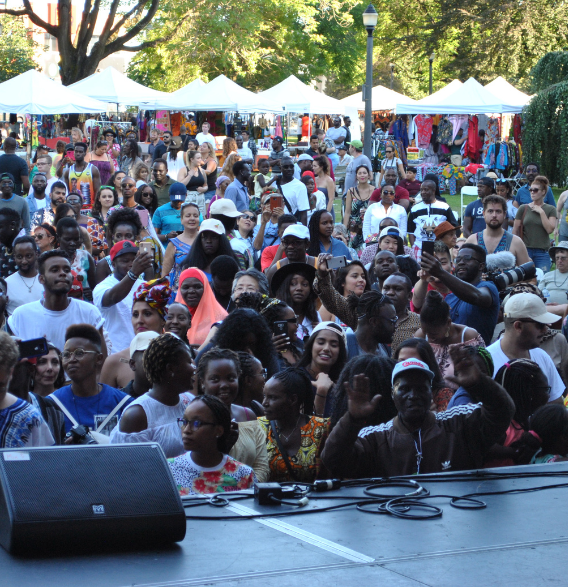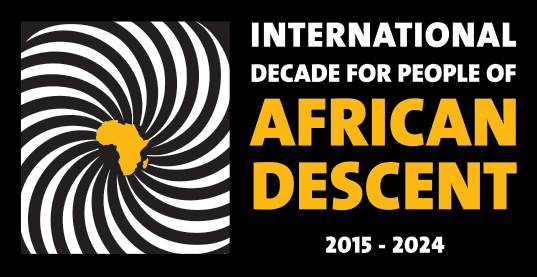PROGRAM DESCRIPTION
UN Decade For People Of African Descent




UNITED NATIONS INTERNATIONAL DECADES FOR THE PEOPLE OF AFRICAN DESCENT.
There are around 200 million people identifying themselves as being of African descent live in the Americas. Many millions more live in other parts of the world, outside of the African continent.
Whether as descendants of the victims of the transatlantic slave trade or as more recent migrants, they constitute some of the poorest and most marginalized groups. Studies and findings by international and national bodies demonstrate that people of African descent still have limited access to quality education, health services, housing and social security.
Children pose in a camp for internally displaced people(Haiti 2012). UN Photo/Logan Abassi. In many cases, their situation remains largely invisible, and insufficient recognition and respect has been given to the efforts of people of African descent to seek redress for their present condition. They all too often experience discrimination in their access to justice, and face alarmingly high rates of police violence, together with racial profiling.
Furthermore, their degree of political participation is often low, both in voting and in occupying political positions.
In addition, people of African descent can suffer from multiple, aggravated or intersecting forms of discrimination based on other related grounds, such as age, sex, language, religion, political or other opinion, social origin, property, disability, birth, or other status. Magdalena “Piyuya” Mora Herrera, leader of the Gangá Longobá (Cuba) © Sergio Leyva Seiglie, They Are We Project
The promotion and protection of human rights of people of African descent has been a priority concern for the United Nations. The Durban Declaration and Programme of Action acknowledged that people of African descent were victims of slavery, the slave trade and colonialism, and continue to be victims of their consequences.
The Durban process raised the visibility of people of African descent and contributed to a substantive advancement in the promotion and protection of their rights as a result of concrete actions taken by States, the United Nations, other international and regional bodies and civil society. Still, despite these advances, racism and racial discrimination, both direct and indirect, de facto and de jure, continue to manifest themselves in inequality and disadvantage.The International Decade for People of African Descent, proclaimed by General Assembly resolution 68/237 and to be observed from 2015 to 2024, provides a solid framework for the United Nations, Member States, civil society and all other relevant actors to join together with people of African descent and take effective measures for the implementation of the programme of activities in the spirit of recognition, justice and development.
It is also a unique opportunity to build on the International Year for People of African Descent, which was observed by the international community in 2011, and to further underline the important contribution made by people of African descent to our societies and to propose concrete measures to promote their full inclusion and to combat racism, racial discrimination, xenophobia and related intolerance. Watch the video “United Nations High Commissioner for Human Rights Zeid Ra’ad Al Hussein hails the launch of the United Nations Decade for People of Africa Descent” here
Programme of Activities for the Implementation of the International Decade for People of African Descent
The UN General Assembly proclaimed 2015-2024 as the International Decade for People of African Descent (resolution 68/237) citing the need to strengthen national, regional and international cooperation in relation to the full enjoyment of economic, social, cultural, civil and political rights by people of African descent, and their full and equal participation in all aspects of society.
As proclaimed by the General Assembly, the theme for the International Decade is “People of African descent: recognition, justice and development.”
Objectives of the Decade
The main objectives of the International Decade are as follows:
- Promote respect, protection and fulfilment of all human rights and fundamental freedoms by people of African Descent, as recognized in the Universal Declaration of Human Rights;
- Promote a greater knowledge of and respect for the diverse heritage, culture and contribution of people of African descent to the development of societies;
- Adopt and strengthen national, regional and international legal frameworks according to the Durban Declaration and Programme of Action and theInternational Convention on the Elimination of All Forms of Racial Discrimination and to ensure their full and effective implementation.
Programme of Activities implementation
The Programme of Activities for the Implementation of the International Decade for People of African Descent, which was endorsed by the General Assembly, is to be implemented at several levels.
At the national level, states should take concrete and practical steps through the adoption and effective implementation of national and international legal frameworks, policies and programmes to combat racism, racial discrimination, xenophobia and related intolerance faced by people of African descent, taking into account the particular situation of women, girls and young males in the following areas:
At the regional and International levels, the international community and international and regional organizations are called, among other things, to raise awareness, disseminate the Durban Declaration and Programme of Action and the International Convention on the Elimination of All Forms of Racial Discrimination, assist states in the full and effective implementation of their commitments under the Durban Declaration and Programme of Action, collect statistical data, incorporate human rights into development programmes and honour and preserve historical memory of people of African descent.
Three generations of Gangá Longobá. The Gangá Longobá where enslaved and forced to work the sugar cane plantations in the XIX century (Cuba). © Sergio Leyva Seiglie, They Are We Project
There are also a number of steps and measures to be taken by the United Nations General Assembly, including the appointment of the United Nations High Commissioner for Human Rights to act as coordinator of the Decade, the establishment of a forum to serve as a consultation mechanism, convening of a final assessment of the Decade, and ensuring the completion of the construction and the inauguration, before the mid-term review in 2020, of a permanent memorial at UN Headquarters to honour the memory of the victims of slavery and the transatlantic slave trade.

